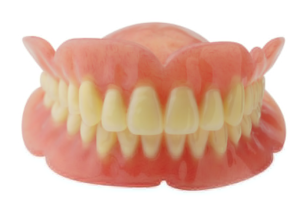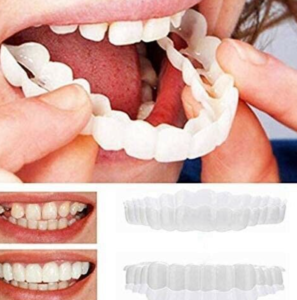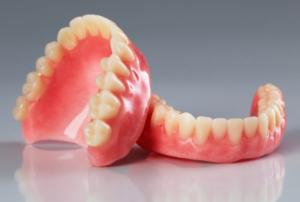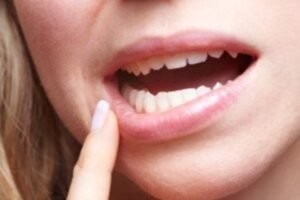If you experience sore spots or ulcers on your gums, difficulty in speaking or eating, excessive movement, or slippage of your dentures, you may have dentures that are too big for your mouth. As the jawbone shrinks, the gum ridge that supports dentures also shrinks, causing dentures to loosen and become uncomfortable.
Denture adjustments, relining, adding implants for support, or getting new dentures are a few options to consider when fixing too-big dentures. Additionally, using denture adhesive can help keep them in place. It’s essential to address any discomfort and pain caused by ill-fitting dentures promptly.
In this way, you can maintain your oral health and enjoy regular daily activities without any hindrance.
Signs Your Dentures Are Too Big
Indications that your dentures are too big:
- Sore spots or ulcers on your gums
- Difficulty in eating or speaking
- Excessive movement or slippage of the dentures
- General feeling of discomfort or pain while wearing them
Dentures may feel too big due to the shrinking of the jawbone and gum ridge, which they rest on. Adjustments can sometimes be made by filing the dentures or relining them, but if the problem is extreme, new dentures or dental implants may be necessary. If the dentures start to loosen, see your dentist for readjustment to fit better in your mouth. Denture adhesive may help keep them in place. Frequent adjustments may be necessary if bone resorption is occurring at a fast rate.
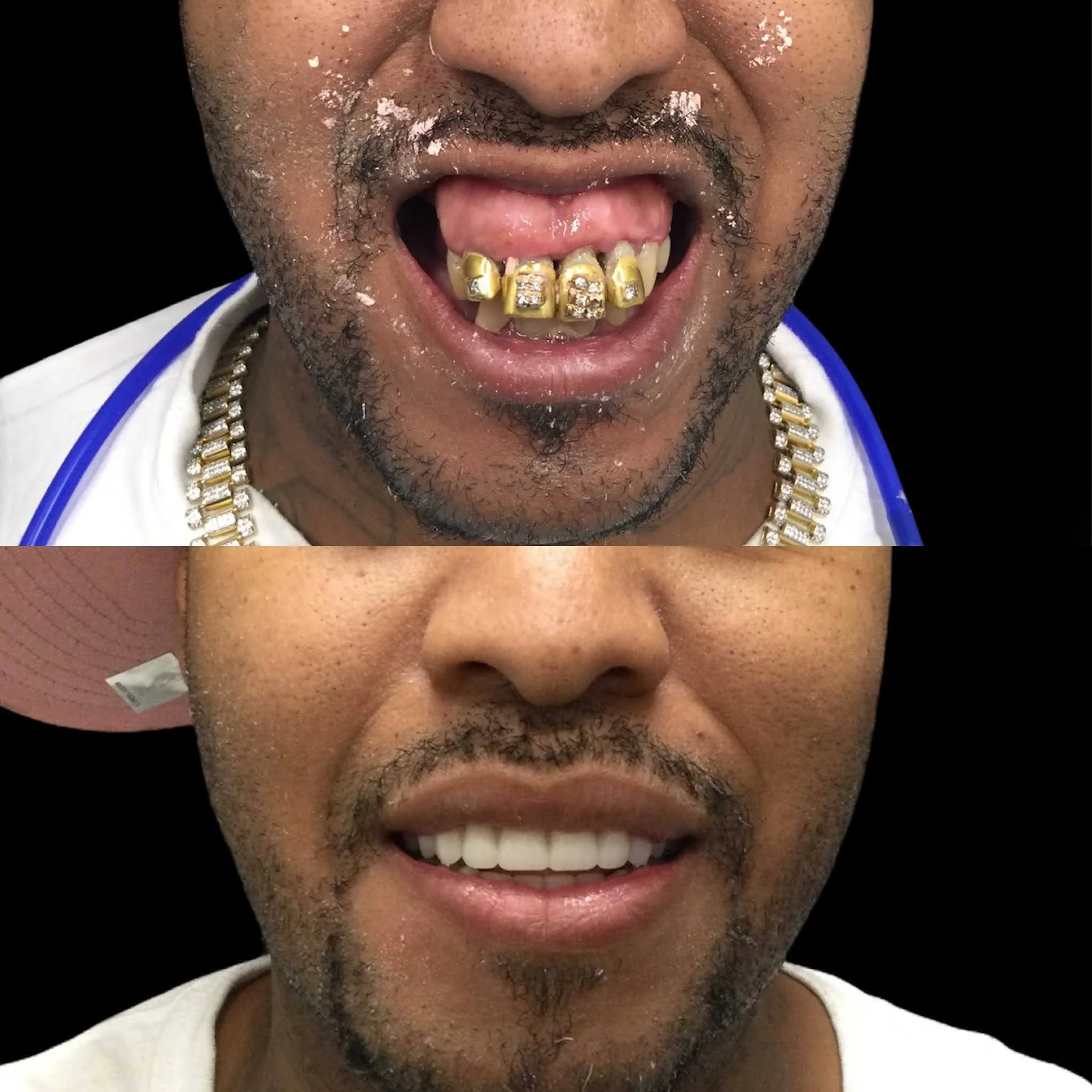
Credit: www.memphisdenturesandimplants.com
Reasons Why Dentures Can Become Too Big
- Shrinking of jawbone and gum ridge
As the jawbone shrinks, becoming smaller in both height and width, the gum ridge it supports shrinks too. Because dentures rest on that gum ridge and are customized to fit its shape and size, dentures loosen as this happens, and for many patients, end up feeling too big for their mouths.
- Inaccurate measurements during denture preparation
Inaccurate measurements during denture preparation can also cause dentures to become too large. Measurements taken by the dentist or denturist should be exact and precise, taking into account every nuance of the mouth such as the depth of the palate and thickness of the gums.
- Retraction of gum tissue
The gums play an important role in the stability and retention of dentures. When the gum tissue starts to retract, it can lead to a loss of suction causing dentures to become unstable and feel too big. The retraction of gum tissue occurs naturally over time and can be caused by various reasons, including poor oral hygiene, smoking, and chronic illnesses like diabetes and heart conditions.
Why Poorly Fitting Dentures Can Be A Problem
Ill-fitted dentures can cause multiple issues for the wearer. Some of these problems include:
- Sores and infections on the gums
- Difficulty in speaking and eating
- Excessive movement or slippage of the dentures
- Pain and discomfort while wearing the dentures
- Bone loss in the jaw over time
Therefore, if you notice any of these symptoms, it is important to schedule an appointment with your dentist. Your dentist will be able to adjust your dentures or recommend alternative options such as relining, using denture adhesives, or getting dental implants depending on the severity of the problem.

Credit: www.reddit.com
Options For Fixing Dentures That Are Too Big
When the dentures are too big for the mouth, it can cause discomfort and difficulty in eating and speaking. Patients can get their dentures adjusted or relined to fit better. If adjustment doesn’t work, replacement or switching to dental implants can be considered as options.
| Relining of the dentures | One of the options to fix dentures that are too big is to get them relined. This process involves adding a new layer of custom-fit material to the dentures, which can improve the fit and comfort. It’s important to note that, while this may be a less expensive option, it’s not a permanent fix and may need to be redone over time. |
| Using denture adhesive | An easy and affordable option for fixing loose dentures is to use denture adhesive. You can apply it to the dentures before inserting them into your mouth, which creates a better seal between the dentures and gums. However, this may not be a suitable option for everyone, as some people may have adverse reactions or find it difficult to clean the adhesive residue from their gums. |
| Getting new dentures | If the dentures are too big and cannot be adjusted through relining or the use of adhesives, then getting new dentures may be the only option. This may be a little more expensive, but it ensures a perfect fit and better comfort. It’s important to work with a qualified dentist to ensure the correct size and fit of the new dentures. |
| Adding more dental implants for support | In some cases, adding more dental implants for support could be an option for fixing dentures that are too big. Dental implants can help anchor the dentures in place, which can prevent movement or slippage. However, this option may be more costly and require surgery. |
How To Properly Care For Your Dentures
Properly caring for your dentures is important to ensure they fit well and last longer. After every meal, rinse your mouth and dentures with lukewarm water to remove any food particles. Use a soft-bristled brush to clean your dentures, but make sure to avoid using abrasive toothpaste as it can damage the dentures. Soak your dentures overnight in a denture cleaning solution to keep them clean and free from bacteria. Regular check-ups with your dentist are also important to ensure your dentures fit well and any issues are addressed promptly.
Tips To Prevent Dentures From Becoming Too Big
Are you struggling with dentures that feel too big for your mouth? Some common signs that your dentures may be too big include discomfort or pain while wearing them, difficulty speaking or eating, and excessive movement or slippage. Explore different options like adjusting, relining or replacing dentures to find a comfortable fit.
Dentures that are too big for the mouth can be uncomfortable and can make eating and speaking difficult. Proper oral hygiene is essential to maintain the health of gums and prevent discomfort caused by poorly-fitted dentures. Avoiding hard and sticky foods can prevent damage to the dentures or gums. Wearing dentures regularly helps the mouth to adapt to them. Sore spots or ulcers on the gums, difficulty in speaking or eating, excessive movement or slippage of the dentures, and a general feeling of discomfort or pain while wearing them are some common indications that dentures may be too big. If dentures become loose or ill-fitting, it is essential to see a dentist for adjustments or replacement. Denture adhesive may help to keep them in place temporarily. In some cases, adding more dental implants for support may be necessary.
When To See A Dentist For Denture Problems
When dentures are too big for your mouth, you may experience sore spots, difficulty eating, speaking, and discomfort. If you notice any of these symptoms, it’s important to visit your dentist to see if your dentures need adjustment or replacement.
| When to see a dentist for denture problems |
|---|
| If you experience pain or discomfort |
| If your dentures are constantly slipping or moving |
| If you have sores or infections in your mouth |
| If your dentures are too big and causing problems |
Some common indications that your dentures may be too big include sore spots or ulcers on your gums, difficulty in speaking or eating, excessive movement or slippage of the dentures, and a general feeling of discomfort or pain while wearing them. If you experience any of these problems, you should schedule an appointment with your dentist to get them fixed. Your dentist may adjust the dentures to fit better or reline them to provide more support. In extreme cases, a replacement or switching to dental implants may be necessary to fix the problem. Remember to consult your dentist if you have any issues with your dentures.
How To Avoid Denture Problems In The Future
Wearing dentures that are too big can cause discomfort, difficulty speaking or eating, and even oral sores. To avoid denture problems in the future, it’s essential to get the proper fit for your mouth. You may need to get your dentures adjusted, relined, or replaced by your dentist if they are too big.
| How to avoid denture problems in the future: |
| • Regular dental check-ups help to maintain oral health and identify any potential problems with dentures • Properly caring for your dentures by cleaning them regularly and storing them in water to prevent warping or cracking • Replacing your dentures every 5-7 years to ensure proper fit and functionality |

Credit: www.reddit.com
Frequently Asked Questions Of Dentures Too Big For Mouth
How Do You Know If Your Dentures Are Too Big For Your Mouth?
If you experience sore spots or ulcers on your gums, difficulty in speaking or eating, excessive movement or slippage of the dentures, and a general feeling of discomfort or pain while wearing them, your dentures may be too big for your mouth.
It’s best to consult with your dentist and have them readjusted or replaced if necessary. Using denture adhesive can also provide temporary relief.
Why Do My Dentures Feel So Big In My Mouth?
Your dentures feel big in your mouth because as your jawbone shrinks, the gum ridge that supports it also shrinks in height and width. This causes your dentures to loosen and feel too big for your mouth. Indications that your dentures are too big include sore spots, difficulty in speaking or eating, and discomfort or pain while wearing them.
Denture adjustments, relining, adhesive, or replacement with dental implants are options to fix this issue.
What Can You Do If Your Dentures Don’t Fit?
If your dentures don’t fit, you have a few options. First, you can get them readjusted or relined by your dentist. Denture adhesive can also be used to keep them in place. If the problem is extreme, dentures may need to be remade or replaced with dental implants.
Indications of ill-fitting dentures include sore spots, difficulty speaking or eating, movement or slippage, and discomfort.
Can Dentist Make Dentures Tighter?
Yes, a dentist can adjust dentures to make them tighter. If dentures are causing sore spots, difficulties when talking or eating, or excessive movement, it may indicate that the dentures are too loose. The dentist can adjust or reline the dentures to improve their fit in the mouth.
However, if bone resorption is occurring rapidly, frequent adjustments may be necessary.
Conclusion
Having dentures that are too big for your mouth can cause a great deal of discomfort and inconvenience. This can include sore spots or ulcers on your gums, difficulties in speaking or eating, excessive movement or slippage of the dentures, and a general feeling of pain or discomfort while wearing them.
However, there are solutions available to adjust the size and fit of your dentures, such as adjustments, relines, or even replacement with the guidance of your dentist. With proper care and attention, you can ensure your dentures are the right size and stay comfortable for everyday use.

